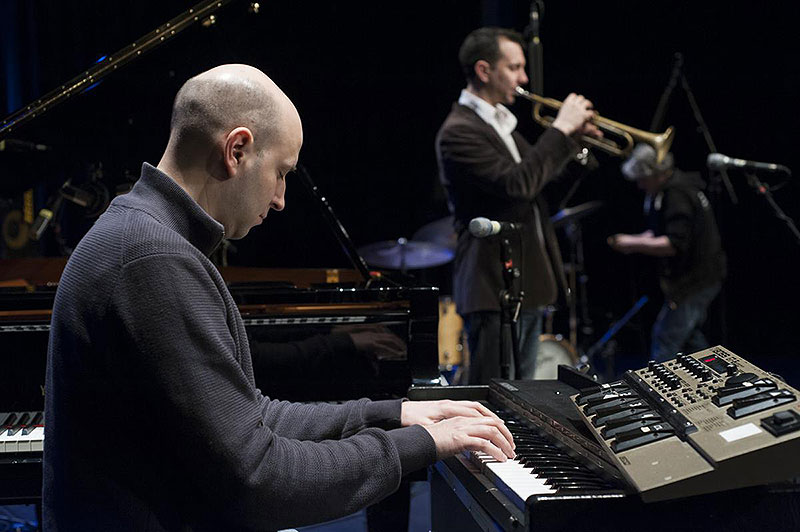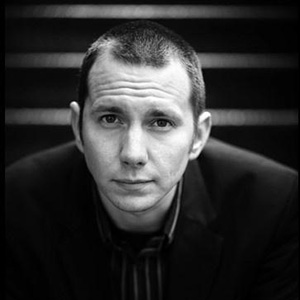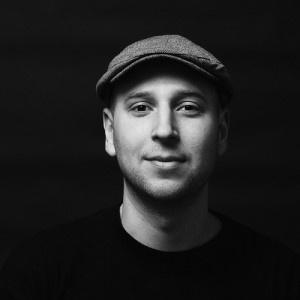
The Antwerp-Chicago Connection: The Bram Weijters, Chad McCullough Interview
A Belgian keyboard player and an American trumpeter, both with Canadian connections, show us that globalization can be a good thing.
I remember watching and enjoying the nightly installments of Jazz: A film by Ken Burns on PBS back in the early 2000s. The accompanying music was released with the title Jazz: The Story of America's Music. While there is no denying that jazz was born in America, that historical title probably doesn’t describe the global experience that jazz has become. Over time jazz has spread around the world and now may be just as popular in Europe as it is in North America. The Vancouver International Jazz Festival now features artists from different countries each year and usually some European country is represented. This year they will have the Made in the U. K. Jazz Concert series. There are also plenty of jazz education and conference opportunities around the world and musicians from all over meet, play music together, study and exchange ideas. Every now and them a lasting musical relationship occurs. Recently I spoke with two jazz musicians from different parts of the world that have toured and recorded together. They met at the Banff Workshop and hit it off musically and then became friends. Chad McCullough is an educator at DePaul University in Chicago and a trumpet player in a number of projects in the Chicago area. Bram Weijters is a keyboard player from Antwerp, Belgium. They recently toured Belgium in support of their latest CD called Feather. Weijters has previously come to North America and has also performed with McCullough. Earlier this month we managed to sync all of our clocks so we could have a three-way conversation about jazz in their worlds.
JD: Tonight on Jazz Notes I’m speaking with two people in two different countries at once. I’m speaking with Bram Weijters who is in Antwerp, Brussels and Chad McCullough, who is in Chicago, Illinois. We are going to talk about the music that they are involved in at the moment, but let’s go back and find out some other information first. When did you start playing music, taking music lessons and what was your first instrument?
BW: I started when I was seven or eight and I started playing piano, which is my only instrument, right now. But I really got into music a little later as a teenager. I started playing a lot of drums and, also some electric guitar and bass. I was mainly playing rock music. Then I got into music and I was still doing classical piano. So, later on, at the age of eighteen, I kind of decided to go further into the piano and dive into jazz.
JD: Bram, you are kind of underselling yourself. I’ve seen you play and listened to some of your CDs. You don’t just play piano. You play anything that has a keyboard. How about you Chad?
CM: I, also, started on classical piano. Maybe at eight or nine, maybe. I grew up in Seattle, so everyone in Seattle in the early nineties had to play in a rock band. I played bass in a garage band. We were probably pretty terrible. I started playing trumpet in the school band at ten and ended up going to the college for trumpet. That became my main focus. I keep up with the piano thing, although not very good. Mostly piano to think and piano to teach.
JD: Ok. Was there a lot of music in both of your homes? Did your parents take lessons, play an instrument, that kind of thing?

BW: Not really my parents. My father liked music, but he didn’t really play it, himself. But, he listened to different stuff including jazz. So, he kind of knew music, but it was pretty basic. They were very supportive. I have two older brothers, who also went to music school. They started with trumpets and flutes. Later guitar and singing and bass. So together with my brothers I was making lots of music. So, it was really in the home, yes.
CM: My parents are not musical at all and there was very little music in the house. So, I was the rebel, by playing music.
JD: That’s kind of cool. Musicians come from all kinds of families. Either of you can answer this. Where and when did you two meet and when did you decided that you should play together.
CM: All right. We met in 2009 at the Banff Centre. We were both there for the jazz at the Banff Centre and played together, a little bit there. I think I was actually in Europe to do a music industry conference and while I was there I reached out to Bram. We played a couple of gigs together. That was 2010, maybe, and the rest is history.
JD: I’ll say it is. Obviously, you are on two different continents. Just the expense to get together, is not easy, but what I’ve noticed off this new CD of yours called Feather, is that your musical expression seems to fit together very nicely. It really shines through on this CD. Any idea why, as there is all this distance between you?

BW: Ya, that’s a good question. I don’t know. It’s probably why we kept on playing together. From the first tour we felt like it was happening and I think over the years it just kept on growing and then you kind of get to know each other better, musically. We also did some hanging, which can also be fun and you get to know each other. So, I think it developed over the years and jazz and everything in general is getting a bit more global. We are in the same direction in music and have listened to some of the same stuff. We get the same influences, but at the same time there are enough differences so that it keeps getting new ideas. It gets really nice to be able to play with somebody from a completely different scene. So it’s like getting some completely new information. Ya, I think that’s pretty much how I feel about it. You, Chad?
CM: There was never any plan, if we do this or play these gigs we’ll take over the world and play bigger gigs—it was just sort of a musical and personal relationship where we played together and it was really fun and we spent time together and it was really fun and now it’s easy. It’s like one of the easiest relationships. I can call Bram at any time or hang out with Bram and any time and it’s wonderful. It’s the same thing when we are playing music and we are not playing music. It was never planned, but it’s easy so we just keep going with it.
JD: This is for both of you. What is the difference between European and North American audiences?
CM: Woo, Bram go ahead.
BW: (laughs) That’s a difficult one and it’s been asked before of course. It’s an obvious question, but it’s hard to answer, I think, because every audience is different all the time. So, I think circumstances, in general are completely different. For example, distances in the States are on a whole other scale. If we are playing in Belgium we can just get into the car, drive an hour, and have a completely different audience. You get to know the cities and how people generally react there. It’s a whole different story in the States. You can drive for an hour and just be around the corner (laughs). It’s way different. Here, we are playing mainly in Belgium. There is a difference in Flanders and Wallonia, but it is really close (geographically). A European audience is really difficult to describe. A French audience is really different from a Dutch audience. And even a French speaking audience in Belgium could be different. I think in the States is bigger, but less different in that way. Also, we don’t really have a really big city in Belgium. The only big city is Brussels, but it is not like any big city. You can’t really compare Chicago to any Belgium city. You would have to compare it to Paris and that’s already a completely other story. I think it's more different here in Europe.
JD: Ya. Ok, what do you think Chad?
CM: I think it’s more different in venue size. For example, if we play a small club or a bar, less of a listening room, they are more the same everywhere. People are going to hang out and have some beers and listen to music. In those situations, we as musicians are going to play differently. We are not going to play quiet, introspective unless it’s conducive to the room. This last tour that we did, there were some rooms that we played totally acoustic in and quiet and soft, because it was a listening, soft seat kind of theatre. And it made sense, whereas, you know, if we play a bar for a late night set it is going to be much more loud and in your face. I think those similarities transcend borders. In some ways it’s different in people’s response—kind of visceral response. You’ll get done in certain places and they will come up and say “That was really nice see you later.” You’ll get other places and play the same music and it was just as good and you will get people clamouring over you to get CDs.
JD: Ok. That answers it well. There is a lot going on there and I didn’t realize that the question would be that involved. Now, I’ll show my ignorance. Bram can have a good laugh after, as I don’t understand the instruments. So, Bram, tell us about the bass synth. I’m hearing the bass sound, for example in “Solid” and “Endless Waiting.” I actually thought it might be a bass player, as I hadn’t looked at the liner notes for the personnel on the CD, duh. I’m also hearing what I would call synthy sound in tracks like “Prelude.” Is that all coming from the same instrument? Is it like a pedal or a table-top unit? What the Hell’s a bass synth? (Both laugh).
BW: Well, it’s a synth a used to place bass lines. It’s a Moog synth. It’s called a sub-fetti. The sub might mean that it is very suited for playing bass. It’s an analog synthesizer that is produced years ago and analog is based on some old vintage filters and stuff. It’s basically a mini-Moog. So I tweak the sound a bit so it sounds pretty close to an electric bass. I just love to play bass, actually, so I can combine my keyboard skills with being a bass player. It’s also a bit of a concept of a Hammond organ player, who sometimes plays bass with the left hand of with a foot. It’s just the concept of playing bass with the chords and it’s really nice and gives a lot of musical possibilities. So, that’s the synth I use for all the bass lines. And in “Prelude” I’m actually also using the synth because it is kind of built around the bass line and I layer two or three other synths. I can’t really remember which ones. It doesn’t really matter. It’s the way you tweak them to get the sounds you want. I once e-mailed Sam Yehel, of the Joshua Redman Elastic Trio who was using synth on the bass lines. I e-mailed him this nerdy question … which synth do you use and stuff like that. He just kind of answered that you can use any analog synth as long as you know how to tweak all the stuff and then it is going to sound the way you want it. I decided to try it like that. I spent some time and this (Feather) is kind of the result. Hope that answers your question.
JD: Yes it does. Thanks, Bram. I appreciate that. Most music talk goes well over my head, but I kind of understood that. Maybe I’m improving. So Chad, I looked through your bio and you seem to have a few ties to Canada. How did this all come about?
CM: I’m a very polite American, so Canadians like me, maybe (laughs)? A lot of my Canadian connections are through the Banff workshop and growing up in proximity to Vancouver (he’s originally from Seattle), there were a lot of great jazz musicians in Vancouver. I got to know Cory Weeds, for example—Jaclyn Guillou—so I would come through and play in Cory Weeds’ club when he had The Cellar. I don’t know. I just always jumped at the chance to play with any Canadian guys. Now there’s a few Canadian musicians in Chicago that I still play with regularly. I don’t think of them as Canadians. I just think of them as good musicians that require a visa occasionally.
JD: Ya, I think that’s how it goes. And Bram, I ran into you in a restaurant in Kamloops, British Columbia. The seating was so tight, I think I was sitting two feet away from you. You finished doing a song and I said to you, “You sound like Duke Ellington on acid.” You replied, “I’ll take that as a compliment.” What’s your connection to Canada?
BW: Chad already mentioned we met at Banff. I went to Banff twice, to the workshop. All the contacts I made there—of course many were Canadians. I played a couple of tours with Jaclyn Guillou, Vancouver based vocalist who was living there, then. I think we met on the first tour. The great thing was that she was Vancouver based, and Chad was living in Seattle and I could combine it and go from Vancouver to Seattle and make it not just a Canadian tour but a North American tour.
JD: I get in my own little world when I listen to your new CD Feather and I envision movies and sounds that could belong on a soundtrack. I know that Chad has been involved in that sort of thing before. Given that my mind is not that understandable, Bram, any reason why that would be going through my head?
BW: I think this music is really about atmosphere’s and moods. I think and hope that a good atmosphere is easy to visualize. I think that is what might be happening. I like it when music seems to have a story, without it being a really clear story. Well, what I’m seeing are some kind of mysterious movies—like what is going on there (laughs) Maybe that’s the kind of stuff you’re seeing, too?
JD: Yes, that is a good way of putting it. That is very close to what I’m experiencing when I’m listening. I love the CD (Feather) and I can just close my eyes and go “Woo, this is going somewhere and that is going somewhere.” That’s good. Thank you. You two have just finished a tour of Europe and what kind of gigs do you have lined up for the summer?
CM: Europe was awesome. We played 18 to 20 gigs, I think. They all were great. It was a good as we could ever have expected. They were all well attended. You know, touring in Belgium, as an American, is kind of a magical experience. You play this gig. There is a lot of people there and then they force feed you Belgian beer. It kind of works that way well. Ya, it was incredible. We sold a lot of our new CD Feather. I have nothing bad to say about it at all. For me, my summer plans are mostly Chicago based. I’m playing with various projects around town, here. I teach at a college, so I’m off for the summer and I’m looking forward to that.
JD: And you Bram?
BW: Ya, I was happy with the tour. It was also nice that we had really had different stuff at the same time going on. We did some shows as a quartet, some duo shows in different line-ups. Like a completely acoustic show, completely electronic, for me. Chad didn’t play the electronic trumpet, though. Well, it was what I was hoping for. For the future plans, for the summer I’m still doing some trio shows—my own Belgian trio and next week a quartet show with my Belgian quartet. I have some other projects. I’m playing with Albert Vila. He’s a Spanish guitar player who lives now in Brussels and we recently made an album with Hamster Axis of the One Click Panther and I’ll play a couple of shows with them. In the summer, I’m also playing some bigger pop festivals, because I also like to do as I like to do some music outside of jazz still, bands that sing in Dutch so you guys are not going to know them. It’s fun to do in the summer, because there is not a lot of jazz going on at summer festivals. It runs some fresh air through my brain and I will be ready for September to play a lot of new stuff again.
JD: You sound like busy guys and good to hear, considering the business you are in. Thanks for spending the time with me. I enjoyed speaking to you both and learned a lot about jazz in other places, today. Good luck with your new CD Feather. Chad and I keep in touch commiserating over our underachieving hockey teams and it was great to talk with you again Bram.
CM: Thank you, Jim.
BW: Thank you a lot.
European orders for Feather: https://bramweijters.bandcamp.com/album/feather
North American orders for Feather: https://earsandeyesrecords.bandcamp.com/album/feather
http://chadmccullough.com/
ttp://bramweijters.com/
























